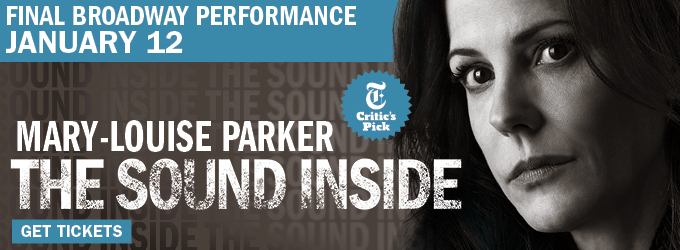Review: Mary-Louise Parker Cerebrally Fascinates in Adam Rapp's Quietly Riveting THE SOUND INSIDE
"Beyond her somewhat forgiving brown eyes," the subject of Adam Rapp's quietly riveting character study, The Sound Inside says of herself, "your narrator could be described as unremarkable. In that thorny subjective bureau of classification known as the Looks Department, if she's being brutally honest with herself, she'd say she's perhaps four or five degrees beyond mediocre, also known as 'sneakily attractive.' She is the equivalent of a collectible plate mounted to a wall."
(Photo: Jeremy Daniel)
A creative writing professor at Yale, descriptions are part of everyday business for Bella. She notes how, in "The Catcher In The Rye," J. D. Salinger allows readers the most minimal details about Holden Caulfield, allowing them to create the rest of the character.
Some "reading" minimal details about Bella (never married, no kids, dresses plainly, lives alone on campus) have "created" her to be, as examples, a lesbian, a witch and collector of cat calendars.
As portrayed by Mary-Louise Parker, who, guided by director David Cromer, is giving her most complete and interesting, cerebrally fascinating New York stage performance since her Tony-winning turn in David Auburn's PROOF, Bella also sports a wickedly deadpan self-effacing humor that even creeps in on occasion when discussing her life-threatening condition.
Designers Alexander Woodward (set) and Heather Gilbert (lights) require us to create Bella's surroundings as well, presenting minimal tangible pieces spotlighted in vast darkness.
The intrusive energy that forces its way into Bella's life is supplied by freshman student Christopher, who insists on barging unannounced into her office for conferences without the courtesy of making appointments. His aversion to following the rules may hint at a sense of privilege and his excuse for not using email ("I prefer penmanship. Getting ink on your fingers. The human effort.") might come off as a bit much, but Will Hochman's excellent, empathetic performance keeps suggesting the unexpressed complexities that influence his behavior.
(Photo: Jeremy Daniel)
Will has begun his first novel. Bella's last book was published seventeen years ago. Through readings of each other's works and discussions of great literature (Dostoevsky's "Crime and Punishment" comes into play here) they develop a deep connection that leads to one requesting of the other an extraordinarily intimate act of trust.
Bella narrates the play. And since it's through her gaze that we see Christopher, she is, in fact, revealing herself. The play's title, mentioned in connection to a stream-of-consciousness writing exercise, guides us through our creation of both of them in this exquisitely realized piece.
Reader Reviews



